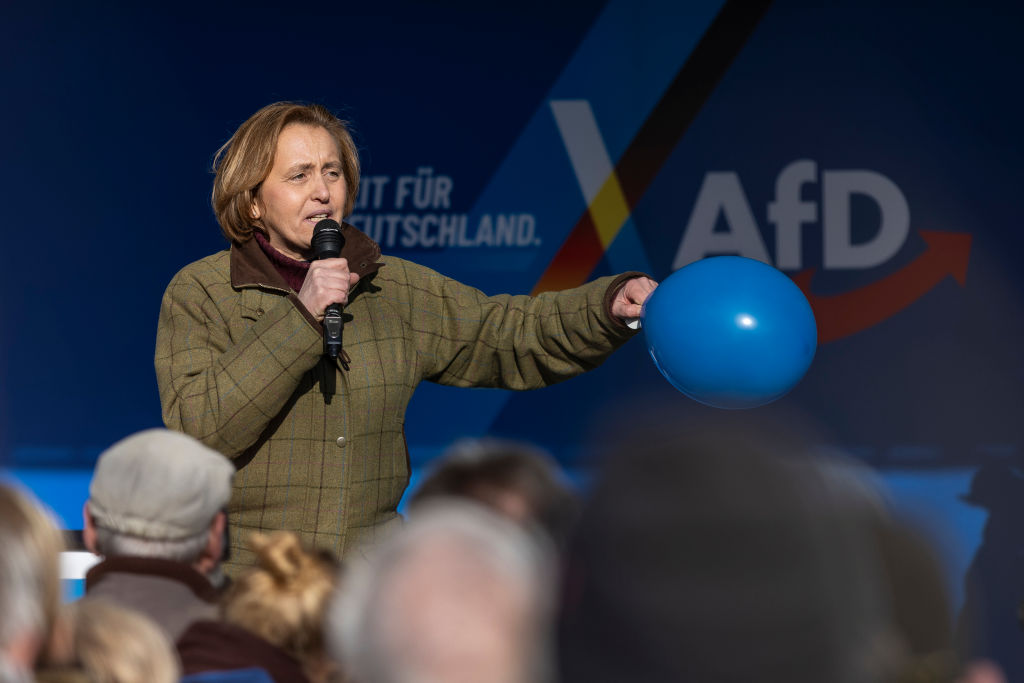EXCLUSIVE: ‘Alternative for Germany’ Leader Tells the Sun That Mysterious Wave of Candidate Deaths Must Be Investigated
A string of deaths raises at least the possibility of foul play against the hard-right party.

A grim trend is emerging in Germany just before a slate of local elections — politicians affiliated with the hard right Alternative for Germany party are dying at what appears to be an anomalous rate, with seven reported deceased since September began.
Elections are set for September 14 for the western state of North Rhine-Westphalia. On September 1, the chairwoman of the AfD, Alice Weidel, posted to X that “Four AfD candidates are dead.” One of Ms. Wediel’s top lieutenants, Beatrix von Storch, tells the Sun that “the matter has to be checked carefully. Some have been ill. That is known. But not all.”
Three more fatalities have since been added to the AfD’s tally to bring the total to seven. The party in a statement explains that the police do not suspect foul play, though others aren’t so sure. A retired economist, Stefan Homburg, took to X to call the clusters of deaths “statistically almost impossible.” Ms. Weidel reposted that assessment.
The AfD has disclosed that two of the candidates died after being “severely ill,” and another had a heart attack. Kidney failure and a suicide were also culprits. Sixteen candidates have died during the election campaign in North Rhine-Westphalia, of which those seven were from the AfD. No other party has suffered more than one death. Some 20,000 seats were contested the last time elections were held, in 2020. A government spokesman says in a statement that the number of candidate deaths is “not significantly higher” than in previous elections.

Another party official, Kay Gottschalk, tells Politico that “What I have in front of me — but that’s just partial information — that doesn’t back up these suspicions at the moment.” He is calling for an investigation, though also warns against “immediately getting into conspiracy-theory territory.”
The world’s richest man, Elon Musk, a supporter of the AfD, has called attention to the deaths to his more than 220 million followers on X. In January, speaking at an AfD conference, Mr. Musk reckoned that in Germany” there is too much focus on past guilt and we need to move beyond that.”
A regional leader of the AfD, Martin Vincentz, said in a statement on Thursday that is “no evidence of unnatural deaths” but also that “If even political murder now seems conceivable for many people, this is a direct consequence of the often ruthless battle that has been waged against the AfD for years.” In May, Germany’s domestic intelligence service categorized the AFD as an “extremist” group.
Germany’s spooks arrived at that conclusion after determining that the “ethnicity- and ancestry-based understanding of the people prevailing within the party is incompatible with the free democratic order.” The AfD has sued to reverse the decision, meaning that classification is paused pending further litigation. In February’s national elections the AfD won some 20 percent of the vote.
That show of strength was second only to Chancellor Friedrich Merz’s center-right alliance of the Christian Democratic Union of Germany and the Christian Social Union in Bavaria. The AfD, though, is shut out of Mr. Merz’s coalition because of what Germans call the Brandmauer, or “firewall.” That refers to the post- World War II refusal of “mainstream” parties to partner with parties deemed far-right.
Mr. Merz, obeying the strictures of the Brandmauer, has eschewed the AfD in favor of welcoming the leftist Social Democratic Party into his government. A poll out last month, though, showed that the AfD can now claim the support of 26 percent of Germans, a result that Politico likens to a “bombshell” given the party’s rightist ideology. Ms. Von Storch tells the Sun that her party will be in government “sooner rather than later.”
That prospect fills some Germans with dread because of the AfD’s alleged ties to Germany’s fascist past. A party official, Björn Höcke, was twice convicted and fined last year for using a banned Nazi slogan — “everything for Germany.” That was a favored maxim of Adolf Hitler’s storm troopers. Another AfD figure, Maximilian Kroh, appeared to defend the Nazi SS in an interview last year with an Italian newspaper.
The party’s firm stance against immigration, though, appears to be resonating in a country that in 2015 and2016 under Chancellor Angela Merkel took in some one million asylum seekers, mostly from Syria. Ms. Merkel coined the phrase Wir schaffen das, or “we can do this,” to describe that initiative. Now, though, Germany’s flagging economy and discontent over immigration could mean that the AfD is on the rise — if only it can keep its candidates alive.

